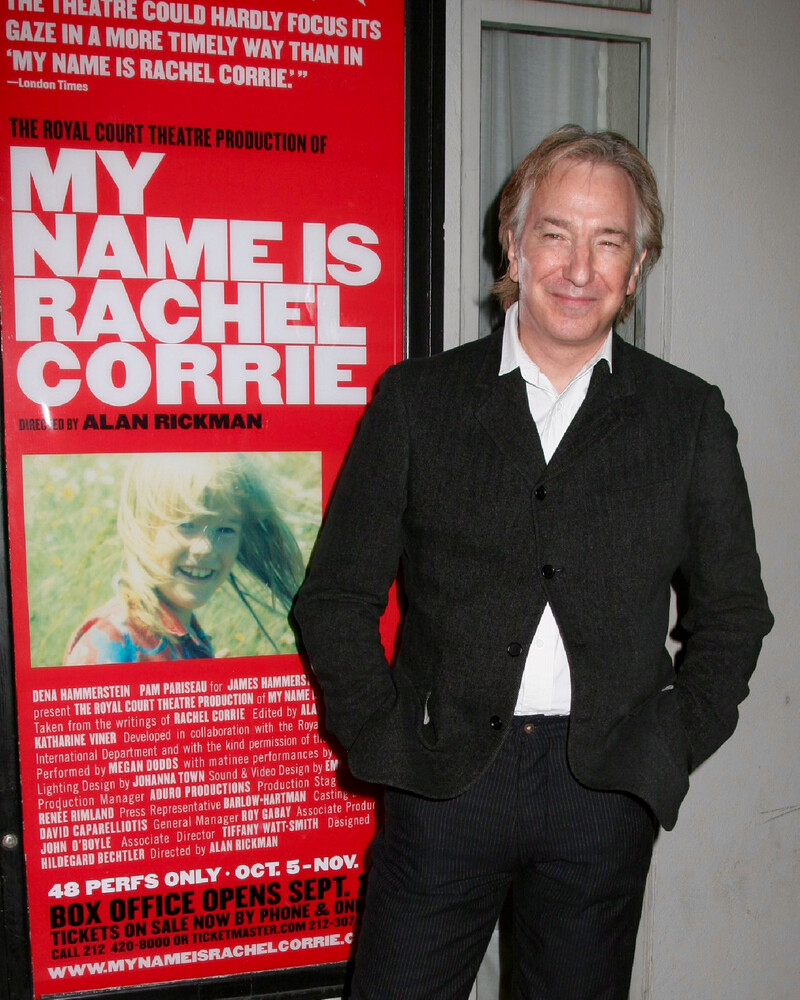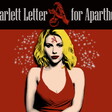Arts and Culture 15 January 2016

Alan Rickman at the opening night of “My Name Is Rachel Corrie,” at the Minnetta Lane Theatre in New York City, 15 October 2006. The play had been canceled by its original venue, the New York Theatre Workshop.
WennAs the world mourns the recent deaths of legendary performers David Bowie and Alan Rickman, it is difficult not to draw a connection between the two men.
Both born in London, they died during the same week, both of cancer, both aged 69 – coincidences that the media did not wait long to point out. Both men had also co-written plays that were to be produced at the same New York theater.
The recent opening of Bowie’s play Lazarus – co-written with Irish playwright Enda Walsh, and now in its final weeks at the New York Theatre Workshop – has figured heavily in coverage of Bowie’s death.
Lazarus director Ivo van Hove was one of a very few people who had been aware of Bowie’s illness, which had been a carefully guarded secret.
“It was immediately clear that it was very serious,” van Hove told The New York Times.
Although work on Lazarus had begun prior to Bowie’s diagnosis, its themes dovetailed perfectly with his desire to leave behind a final set of works that would address his own death.
Bowie’s 27th studio album Blackstar, released just two days before he died, includes a track also entitled Lazarus.
In the video, Bowie sings of heaven and levitates over a hospital bed before disappearing into a coffin-like wardrobe.
As New York Theatre Workshop artistic director James C. Nicola put it in the same New York Times article, “What seemed not too long ago intriguingly complicated, ambiguous and opaque now seems pretty clear: a man who was yearning for immortality.”
On Tuesday, as the cast – themselves having been unaware of Bowie’s illness – performed the play for the first time since Bowie’s death, a video screen displayed a photo of Bowie, and fans placed flowers and notes in an improvised memorial outside the theater.
Proudest moment
Like Bowie, Rickman had also kept his cancer a secret, his death being announced Thursday morning in a simple statement from his family.
Unlike Bowie, he is not known to have directly addressed his illness in his artistic output.
Though Rickman was known to a mass global audience for playing Professor Severus Snape in the Harry Potter films, he was political to the end.
He gave his final onscreen performance alongside Helen Mirren in the drama Eye in the Sky, which he had described as “a film about the moral responsibilities governments face regarding the use of drones.”
More striking, however, than the two men’s differing approaches to their impending deaths was the very different manner in which their work had been treated by the same New York theater.
In 2005, Rickman directed the initial London run of My Name is Rachel Corrie, a play based on the writing of the US activist crushed to death by an Israeli bulldozer in Gaza two years prior.
Rickman had been moved to produce the work, staged at London’s Royal Court Theatre, after reading Corrie’s published emails in 2003.
Corrie’s friend Rochelle Gause attended one performance accompanied by another friend of Corrie’s, and shared her account with The Electronic Intifada:
“We sat through the play holding hands and shedding tears, nothing is as odd as sitting in a theater on the other side of the world watching a woman act as your murdered friend using only words written by Rachel on a stage replicating your town, her bedroom, her spirit. The play was so well done, so powerful, and after it ended Alan Rickman met us, bought us drinks and sincerely asked us if we thought the play was an accurate depiction.”
Katharine Viner, now editor-in-chief of The Guardian, was commissioned by Rickman to assist in editing the play.
She shared her own memories of that time in an article this week.
“When asked recently about his proudest Royal Court moment, his answer was not about him,” Viner recalled of Rickman. “He said it was when he took Rachel Corrie’s parents outside the front of the theater to show them their late daughter’s name in neon lights.”
“Censorship born out of fear”
A wild success in London, the play was set to be staged at the New York Theatre Workshop in 2006, but the legacy of Rachel Corrie was to meet with very different treatment than that of David Bowie.
As Viner told Democracy Now!, “The production schedule was finalized. Both sides of the Atlantic had agreed on a press release that was going to go out to the press, announcing the production of My Name is Rachel Corrie, and then the Royal Court, as I was told, received a telephone call saying that the play was to be postponed indefinitely.”
“Calling this production ‘postponed’ does not disguise the fact that it has been canceled,” said Rickman. ”This is censorship born out of fear, and the New York Theatre Workshop, the Royal Court, New York audiences – all of us are the losers.”
Artistic Director James C. Nicola cited a variety of reasons for the “postponement” including the recent stroke of Israel’s then-Prime Minister Ariel Sharon, and “distorted accounts of the actual circumstances of Rachel’s death.”
While the Israeli government has always denied any responsibility for Corrie’s death, the circumstances of her killing remained the subject of active litigation in the United States, and later in Israel, through 2015.
“It seemed as though if we proceeded, we would be taking a stand we didn’t want to take,” Nicola told The New York Times, claiming that he had consulted “local Jewish religious and community leaders” to inform the decision.
Whether any Palestinian religious or community leaders were consulted is unclear.
A subsequent letter to The New York Times, signed by two dozen cultural figures, including the Nobel Prize-winning playwright Harold Pinter and author and actor Stephen Fry, stated: “The various reasons given by the workshop – Prime Minister Ariel Sharon’s coma, the election of Hamas, the circumstances of Rachel Corrie’s death, the ‘symbolism’ of her tale – make no sense in the context of this play and the crucial issues it raises about Israeli military activity in the occupied territories.”
“Rachel Corrie gave her life standing up against injustice. A theater with such a fine history should have had the courage to give New York theater goers the chance to experience her story for themselves,” the letter concluded.
“This is a play really about my daughter,” Rachel Corrie’s father Craig told Democracy Now! amid the controversy. “It’s through her words and a little bit of [Rachel’s mother] Cindy and me and somebody else. To me, they should just let that – let those words come out. Let our daughter talk for herself.”
The play was ultimately staged at New York’s Minetta Lane Theatre.
When Harry Met Pali
Rickman, who until the 2000s had been known outside his native United Kingdom mainly as the smarmy antagonist in Die Hard, achieved global fame with his role as Snape.
Since the 2006 debacle, others associated with the Harry Potter franchise have staked out opposing positions on Palestinian human rights.
Miriam Margolyes, who portrayed Professor Sprout in the films, has described a single secular state for Israelis and Palestinians as the “obvious solution.”
Author JK Rowling, however, signed a letter opposing boycotts of Israel.
Rowling’s literary agent Neil Blair is one of the driving forces behind Culture for Coexistence, the anti-boycott group lauded in the letter.
He is also a supporter of another “coexistence” group funded by Israel’s Bank Hapoalim, which finances the construction of settlements in the occupied West Bank.
Don’t help Israel oppress
Bowie, for his part, tended to eschew direct political commentary, and is not known to have publicly weighed in on the subject of Israeli policy.
He did perform in Israel several times, but his most recent concert there was in 1996, a decade before the Palestininian civil society call for boycott, divestment and sanctions (BDS).
Friend and confidant Brian Eno, however, who produced three seminal records with Bowie in the late 1970s, recently co-authored a letter (of which Bowie was surely aware) calling on musicians to refrain from performing in Israel.
“Palestinians are not asking you to save them,” the letter states. “By calling for a boycott of Israel, they are only asking you not to help Israel oppress them.”
Eno also discussed the boycott in a video released last month:
Update
Rachel’s cousin, Beth Corrie, posted the following statement to her personal Facebook page, which she has granted permission to share:
There will be many tributes to Alan Rickman, all richly deserved, but something very few will know about or mention is that Rickman was a strong supporter of Palestinian human rights, and it was his idea, along with Katherine Viner, an editor at the UK newspaper The Guardian, to take my cousin Rachel Corrie’s emails and journals and turn them into an excellent play. This play, My Name is Rachel Corrie, has been performed all over the world, in multiple languages, and has brought Rachel’s story to thousands of people. It has particularly inspired young people, who are moved by Rachel’s willingness to break out of the script of “success” and do something with her youthful energy that saved lives and witnessed for peace. Thank you, Mr. Rickman, for lending your artistic skill, and considerable reputation, to Rachel’s story, and making it accessible to so many people.






Comments
They are such wonderful
Permalink Nazmul Ahasan replied on
They are such wonderful people. The liberal voices have always called on all not to help the repressive state. Thank you, sirs.
The deep shame I carry is the
Permalink Lin Lobb replied on
The deep shame I carry is the worlds lack of empathy for the Palestinians and Israelis constant persecution of them.
And my disgust that the making of the state of Israel was not better thought out. Since it wasn't why have no governments, or the UN come the the aid of the Palestinians and physically removed the Israelis from the ILEGAL SETTLEMENTS?
If anyone has any doubts look on YouTube to see what is going on including the shooting and stone throwing at children who are on their way to school.
Guardian of what, exactly?
Permalink tom hall replied on
A fine tribute to a conscientious actor as well as a man of conscience, Alan Rickman. His co-author Katharine Viner now edits the Guardian, which prominently and selectively advocates for Israel. If she enjoys real influence with the paper she edits, she might consider cutting back on the hasbara published there. Ha'aretz is much more honest about the scale of Israel's crimes, the horrific cabinet-level racism, and the long-term aims of successive governments.
The Guardian's coverage today resembles that of the New York Times in its deference to Israel. Unarmed Palestinian demonstrators killed by IDF snipers are invariably said to have died "in clashes". In Guardian reports on violent incidents, Israeli claims of Palestinian attacks are privileged over eyewitness accounts, and every news item gives precedence to Israeli dead as outweighing in importance the far greater numbers of Palestinians killed. Little mention is made of the torture of prisoners, including children, of Israel's laws and policies mandating harsh discrimination, the illegal detention of Palestinian legislators- the list of outrages overlooked or ameliorated in coverage, is a long one. And of course, there's the virtual closure of the Guardian's celebrated "Comment is Free" service and banning of untold numbers of contributors, when the story in question pertains to Israel/Palestine.
So Katharine, if you're reading this, here's a suggestion. Do you really want to uphold the memory and contribution of Rachel Corrie? Then introduce a more truthful set of journalistic practices where you work. Otherwise, you're just filling up your cv with somebody else's credentials.
FACT
Permalink Miss Castello replied on
Well said.
Coverage of "clashes."
Permalink Philip Hopper replied on
Thank you Tom. In Gaza the ratio of Israelis to Palestinians killed has been about 100 to 1 during at least the last two Israeli military adventures there. In the West Bank the ratio is high but not not quite so high. Still, Israelis are usually "kidnapped" in the Western press while Palestinians are usually "captured."
However, do not lay this entirely at the feet of the Western Press. Rashid Khalidi has pointed out that wealthy gulf states could easily afford to set up a News or public relations apparatus in the West to counter hasbara. Something beyond Al Jazeera in its English language version. Why not?
Thanks, Abraham.
Permalink Peter Lake replied on
For presenting yet another part of the puzzle that illustrates the life of an artist I'd long admired for his acting... and now for his heart.
Addendum
Permalink Abraham Greenhouse replied on
A true class act: Despite NYTW having censored his play in 2006, Rickman showed up a few years later to support another production there:
https://twitter.com/NYTW79/status/149547179525148673